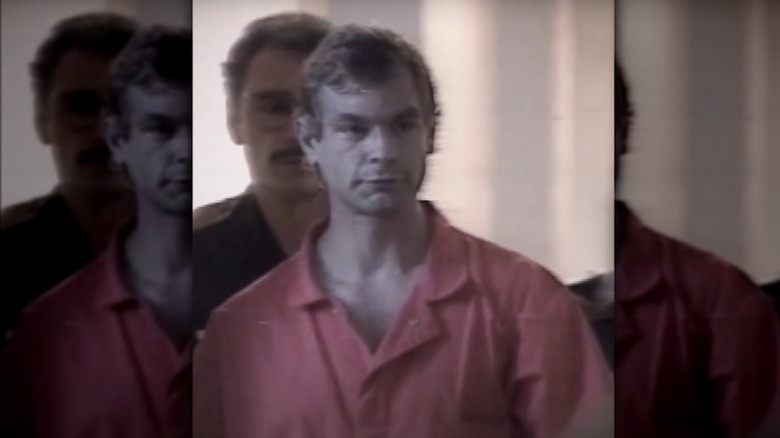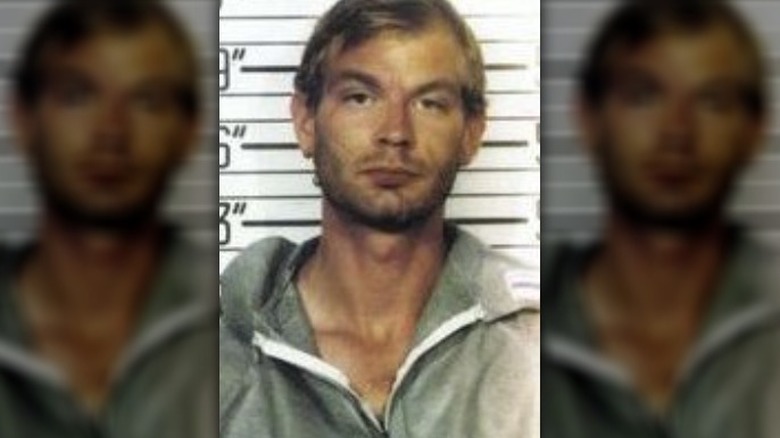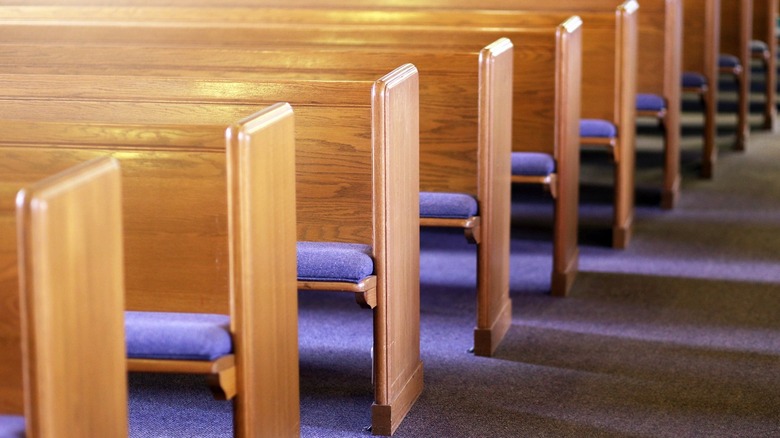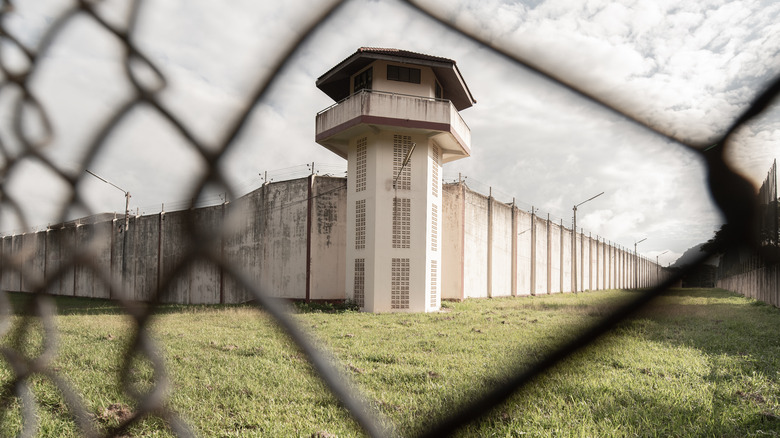What Jeffrey Dahmer's Life In Prison Was Really Like
On July 22, 1991, authorities were led to the Milwaukee, Wisconsin, apartment of Jeffrey Dahmer by a man who escaped after being held captive. Immediately upon arrival, authorities noted a foul odor inside the apartment. On further inspection, Biography reports they found crates full of chemicals, a drawer full of macabre Polaroid photos, and numerous body parts — including five severed heads.
History reports Dahmer was ultimately charged and convicted of 15 counts of first-degree murder and subsequently sentenced to 15 life terms, which were to be served consecutively, and was given an additional life sentence in 1992 for another murder confession (via AP).
As reported by Biography, Dahmer arrived at the Columbia Correctional Institution in Portage, Wisconsin, in February 1992. Due to the heinous nature of his crimes, Dahmer's case gained international attention. Therefore, in the interest of his own safety, he was placed in protective custody and held in isolation. As reported by Biography, Jeffrey Dahmer was also kept in shackles whenever he was out of his cell.
It wasn't too long before Dahmer was moved out of isolation
After serving one year, Jeffrey Dahmer asked prison officials to reconsider their decision to keep him in protective custody. As he had been cooperative and did not have any major infractions, he was moved out of the isolation cell and into a unit for prisoners with emotional and mental health difficulties. In the new unit, Dahmer had the freedom to interact with others. In addition to sharing meal time, Biography reports he was allowed to attend classes and sign up for work duties. Although some of the activities were not supervised, Dahmer appeared to get along with everyone.
Dahmer also began meeting and spending time with prison minister Roy Ratcliff. As reported by Christianity Today, Ratcliff said Dahmer expressed sincere remorse for the crimes he committed and even suggested he "should have been put to death" as punishment. During an interview, Ratcliff said, "He became a real person to me, so I referred to him the same way I would anyone I knew personally."
He found God in prison
Jeffrey Dahmer began taking a Bible correspondence course while he was incarcerated. The course was mailed to him by Curt Booth, who was a member of Oklahoma's Crescent Church of Christ.
As reported by The Christian Chronicle, Booth learned about Dahmer while watching news coverage about his trial. In an interview, which Booth saw on television, Dahmer proclaimed he just wanted to "find a little peace." Booth said he could tell the convicted killer was hurting, and sent him the course material because he wanted to help Dahmer find peace through religion.
After completing the course, Dahmer expressed an interest in being baptized. However, the prison did not have a formal baptismal tank and nobody seemed willing to bring one in. Booth eventually got in touch with prison minister Roy Ratcliff and they arranged for the baptism to take place in the prison's whirlpool bathtub. Biography reports Dahmer was baptized in May 1994.
Following his baptism, Dahmer purchased 25 Bible correspondence courses, which he distributed to his fellow inmates.
A prisoner attacked him during a church service
Jeffrey Dahmer, who was held in protective custody at the prison during his first year, asked to be given more freedom of movement (via Biography). Prison officials agreed and assigned him to a ward with inmates who experienced emotional disorders. This gave Dahmer more freedom, letting him eat with other prisoners, perform work duties, and attend church services at the prison chapel. It was in the latter that he was attacked in July 1994 by another inmate.
His would-be assailant, Osvaldo Durruthy, told The Daily Mail that he feigned mental illness so that the prison would house him in Dahmer's special unit. After sneaking a shank into the chapel, Durruthy lunged at his target and tried to slit his throat. Fortunately for Dahmer, the blade broke and left him with mere scratches. Durruthy was given an additional five years on his sentence for his efforts.
Jeffrey Dahmer had a gruesome sense of humor
Although Jeffrey Dahmer became a Christian and was baptized, he seemed to maintain a ghoulish sense of humor — which his fellow inmates did not appreciate. As reported by Biography, Dahmer routinely made jokes about cannibalism. In addition to "mold[ing] his prison food to resemble body parts or severed limbs, with ketchup as blood," he routinely warned guards and his fellow inmates that he may bite them. Dahmer also reportedly posted a sign, which advertised a "Cannibals Anonymous" meeting.
On November 28, 1994, Dahmer and fellow inmates Jesse Anderson and Christopher Scarver were cleaning the restrooms in the prison's gym. Biography reports the three men were alone inside the restroom for approximately 20 minutes. When the guards returned, they found Anderson and Dahmer badly beaten. Both men ultimately died as a result of the wounds inflicted by Scarver.
As reported by Independent, Scarver later said he was "unnerved" by Dahmer's behavior, including his habit of making his food look like dismembered bodies. Scarver said Dahmer "crossed the line with some people — prisoners, prison staff." He added, "Some people who are in prison are repentant — but he was not one of them."
Scarver said he generally tried to stay away from Dahmer. However, while they were cleaning the restroom, someone poked him in the back with a mop. Scarver said when he turned around, both Anderson and Dahmer were laughing.
He spoke with his family regularly
In a 1994 interview on "The Oprah Winfrey Show," Jeffrey Dahmer's father told host Oprah Winfrey that he remained in close contact with his son while he was incarcerated. This included weekly telephone calls and monthly, in-person visits with Dahmer at the Columbia Correctional Institution in Portage, Wisconsin. These visits would often include Dahmer's stepmother, Shari. In one of the visits, father and son sat with Stone Phillips in an interview the NBC reporter conducted at the prison.
Dahmer's mother, Joyce Flint, also made visits to Portage to see him, though they were not a regular part of her routine. Flint had long since relocated to California, and she was only able to make the journey to see her son a handful of times before he died in the facility in 1994. In an exclusive interview with journalist Diane Dimond, Flint stated that she did make weekly phone calls to Dahmer and expressed concern that he was not receiving the mental health evaluations she felt he needed.
Dahmer's only sibling, a younger brother named David, severed all ties with him after his 1991 arrest for murder. Esquire reports that David refused to be present at any of his brother's court proceedings and never visited him in prison after his conviction. He has since legally changed his name.
Jeffrey Dahmer was killed by a fellow inmate
Christopher Scarver said he was unsure whether Jesse Anderson or Jeffrey Dahmer poked him, but he was not going to let either of them get away with it. As reported by Independent, Scarver followed Dahmer into a locker room. Scarver said he always kept a newspaper article in his pocket, which detailed Dahmer's crimes. When he pulled the article out and confronted him with it, Dahmer reportedly "started looking for the door pretty quick." However, before he could leave, Carver struck him in the head with a metal bar.
As reported by Biography, Dahmer's attorney, Gerald Boyle, believes he knew he would be killed when he asked to be placed in a unit with other inmates. Boyle said, "Dahmer had a death wish, and I know he didn't have the gumption to do it himself, so I predicted that the day would come when he would be killed in prison."






